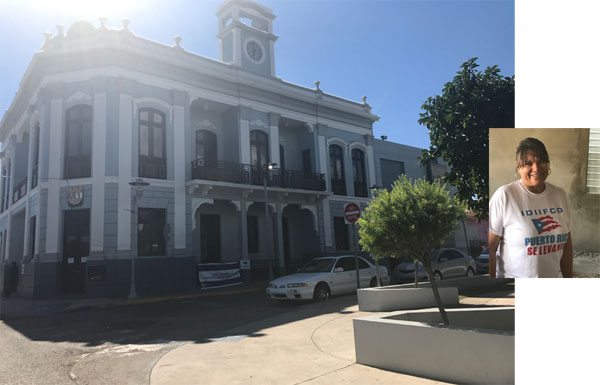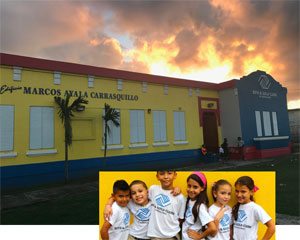
This week, NPQ will be running a series of articles on Puerto Rican nonprofits and how they’re operating and thinking in the wake of Hurricane Maria. It’s part of our effort to illuminate the processes of building anew and recreating from disaster in a region where inequity is already extreme. More generally, the stories provide a glimpse of the vision, reality, and experiences of those affected most by a devastating combination of growing global economic inequality, environmental change, and democratic failures. Because of that, we hope they will be useful far beyond the boundaries of Puerto Rico and its supporters.
We expect this series to be of interest to nonprofits, infrastructure organizations, and funders alike, so please help us distribute it. We expect to continue this conversation well into the future, so we welcome your comments and feedback. Many of you have already shared how the articles in this series to date have helped you better understand the complexities of the situation, the choices that need to be consciously made, and the prominent role nonprofits play.
When I catch up with Sor Julia Cintron, executive director of the Institute for the Integral Development of the Individual, the Family, and the Community—IDIIFCO for short (Instituto Desarrollo Integral Individuo, Familia, y Comunidad)—she is on a residential road in Guánica, handing out provisions. It is a few days before Christmas, and Cintron, who is also known as “the radical nun,” turns the distribution into a street party, complete with a music caravan, Christmas cakes, and cheer.
Cintron tells us that the community of Guánica, like much of Puerto Rico, needs more than food, water, and other essentials; it needs hope and joy. She says, “We’re giving people psychological service because many are affected, given the circumstances, and also the schools are asking us to give talks to work with trauma, and how to manage these situations that create fear and uncertainty.”
It can be challenging to square the trauma Cintron speaks of with the picturesqueness of the town. When my team and I drove into Guánica, the first things I noticed were the small, brightly colored, neat houses that line the streets. The traditional town plaza is enclosed with three-story buildings. Nowhere did I see even a piece of trash.
But, Cintron says, “This neighborhood was not what you see now. This was a slum, a place with poor housing, people that squatted.” Back then, Guánica had no paved streets, no water or electricity.
The town was once dominated by Central Guánica, one of the largest sugar mills in the Caribbean. The mill’s founding in 1901 created one of the first company towns in Puerto Rico, with a hospital, school, and housing built for the workers. The mill closed in 1982.
The town includes the Guánica State Forest, a small, dry forest reserve that was designated an international Biosphere Reserve in 1981 and is home to many rare bird species. It is a contrast to the Caribbean National Forest of Puerto Rico, which is a tropical rain forest.
The 2010 Census puts the town’s population at just under 20,000, but its 2017 population estimate was already showing a decline, with numbers slightly less than 18,000. Like many other municipalities in Puerto Rico, Guánica has experienced an exodus. The 2012 Census Survey of Business Owners shows no businesses in the town. Sixty-three percent of the population lives below the poverty level.
Since 1993, IDIIFCO has hunkered down in Guánica, working to build a town seemingly from the ground up. Cintron explains that the growth of the town stems from the work of the Dominican Sisters of Fatima. When she and her team visited the squatter homes over 20 years ago, she saw what she calls “the problematics of the family.”
She recalls, “We saw that adults needed to graduate high school. People had first-, second-, or third-grade educations. So, we set ourselves the task for them to be able to finish high school, because the situation was becoming in Puerto Rico that if you didn’t have a high school diploma, you couldn’t have a profession. That was in the ’80s and ’90s.”
IDIIFCO’s technical and vocational courses have included pizza-making, cabinetmaking, welding, cake-making, and hair styling and aesthetics. Cintron recounts that these courses helped residents employ themselves, “and that’s how this community started to develop.”
Cintron explains the cleanliness as the result of another one of its efforts. “We’ve had high incidences of Zika, Chikungunya, dengue and, because of Hurricane Maria, Leptospirosis. We had a campaign about the importance of hygiene in your surroundings, including not allowing water to accumulate. That’s what made it so that people were always cleaning.”
My guide, Nirvana Gonzalez Rosa, coordinator of Puerto Rico’s nonprofit network, the Single Voice Movement (Movimiento Una Sola Voz), adds, “The only way to prevent that, especially if you don’t have help from the municipality, is to have to have an organized community.”
IDIIFCO also addresses violence in the community—domestic, sexual, criminal offenses. Guánica has the distinction of being the place where US troops landed in 1898 when it seized the island from Spain in the Spanish-American War. The US invasion was expected in heavily fortified San Juan, but the sheltered harbor of Guánica Bay made it a perfect location for a surprise attack. One gets the feeling that this ontological violence still lurks in the antiviolence work of organizations like IDIIFCO, and that it signifies so well.
Sign up for our free newsletters
Subscribe to NPQ's newsletters to have our top stories delivered directly to your inbox.
By signing up, you agree to our privacy policy and terms of use, and to receive messages from NPQ and our partners.
Cintron says, “We are dealing with the high percentage of violence; that’s why we started the campaign to ‘live your values.’”
When asked about the causes of the violence, Cintron focuses on domestic violence. She says, “That process of knowing each other, the engagement, that process doesn’t happen anymore, and that’s where the problem comes from.”
But Gonzalez Rosa cuts to the chase, “That’s called machismo. There’s work to do to eradicate those values in the boys—and in the girls, because the girls learn the same thing. There wouldn’t be aggressors if there weren’t victims that permit it. There are many women who are caught up in romantic love: If he’s jealous, it means he loves me; if he controls me, it means he loves me. Those are things we have been fighting for years. You have to do it during youth, eradicate those values in affective relationships because they’re based on power.”
IDIIFCO doesn’t just ask the community to live its values, it does so too. One person who personifies this is Norma Ortiz, the board president. Ortiz says, “I come to IDIIFCO through Law 54, because I was a maltreated woman.”
Law 54, Puerto Rico’s “Domestic Abuse Prevention and Intervention Act,” penalizes and seeks to eradicate domestic violence, making it the first Latin American country to create a law against domestic violence—it wasn’t a crime before. It also wasn’t a crime for a husband to sexually violate or psychologically abuse his wife. Gonzales Rosa was part of the team that passed that law in 1989. She says, “It cost us, but we achieved it.”
Ortiz knows this reality all too well. She recounts,
I was destroyed, with a daughter with physical conditions, in a 27-year marriage. I had retired from the government, where I worked in the Department of Family Affairs. I thought I would go home and be a housewife and be happy with my family. But what happened? I had been mistreated my whole life and never noticed, or I put up with it because of the society, for the family, for my kid. I attempted suicide twice. But the moment came when the emotional mistreatment was so much that I decided that he wasn’t going to hurt me anymore, him or anyone else. That was 2015.
I thank God every moment of my life that I arrived here, because my life totally changed. I came here for my therapy. I had a social worker, and through her I got to the cake-making course. I studied a year and a half. There, thanks to my teachers, my colleagues, and the institution, my depression went away. I started to prepare emotionally. And there, all that went away. I saw that life is beautiful.
Sometimes, we get into situations…I remember and I still get emotional because I worked as a social worker my whole life but I couldn’t deal with what was happening to me myself. I had to find professional help from a colleague. Before I came here, I used to say that my life wasn’t worth much, that I was trash, because that’s what I heard constantly.
Through IDIIFCO, Ortiz was able to get a scholarship to participate in an intensive business development program for women run by the Sila María Calderón Foundation. (I give a brief background on this organization in another story in this series.) The course costs $12,000, but scholarship recipients pay only $100.
Ortiz says, “They taught us how to run a business, how to manage money, how to manage emotions, how to treat the public, the way to dress, how to talk to a visitor, how to express myself when I’m negotiating with peers, how to walk, how to sit. Those are details that sometimes we don’t pay attention to and you have to as an entrepreneur.”
Fifty women are selected every year for the course, and Ortiz feels lucky. “Not everyone gets in,” she says. Today, she runs a catering business. “I make donuts, cakes, pastries. I owe a lot to IDIIFCO and the Sila María Calderón Foundation, but IDIIFCO is in my heart. I’m the president of the board. It’s been a year now. Coming here through a Law 54 case for violence protection, I never imagined I’d end up being the president.”
Guánica is a community that has done something countercultural; it has managed to develop itself even in the midst of a terrible economy and with not much external support. It reinforces that when we build the commons together, there’s incredible richness available. It gets to the core of what we have to do as nonprofits: create a self-reinforcing system where people understand that their future is tied to the future of others.
When systems fail, people attend to the local. What’s powerful about what is local somehow needs to spread and reseed what comes later. Systems don’t change from the center, but from the periphery, where lack demands mutuality and innovation. Puerto Rico offers those of us who care about social change a real-life example of a country seeking to move beyond not only post-colonial relations but extractive capitalism to a more mutually beneficial economy based on the commons. What remains to be seen is if and how this change spreads. The stories in this series highlight the depth of capacity of the Puerto Rican people, the conviviality of the culture, and the beauty and bountifulness of the land. How do these resources connect to form a more resilient, self-determining whole?













